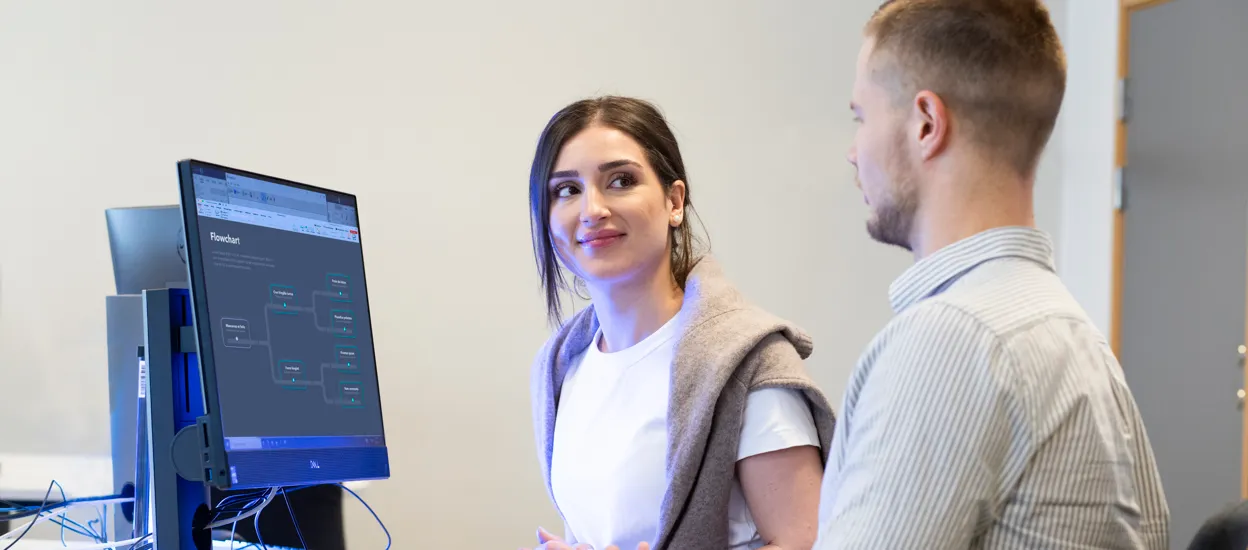
Master's Programme in Digital Service Innovation
Digitalisation fundamentally changes society by reducing or eliminating entire sectors and occupations, while boosting and creating new ones. Innovative and competent digital service designers have an important role in meeting the opportunities and challenges that accompany digitisation and the climate challenge. The Master’s Programme in Digital Service Innovation contributes to your personal development, increases your competence in digital service innovation, sustainability and digital business models, and makes you attractive on the labour market.
Education occasions
About the education
Innovative environments, methods and tools
Halmstad University is an innovative environment for education and research and the Master's Programme in Digital Service Innovation is an academic master's education. This means, among other things, that you study scientific articles, pen a research proposal and carry out a master's thesis study. Our methods and tools are grounded in informatics, design theory, service innovation and practice. The programme includes themes like innovative design thinking, sustainable digital service innovation and societal resilience and much of the work is done in the design studio.
In the design studio you blend theory and practice, and advance your competence by working on design assignments from companies, public sector or research and development projects. The studio is a modern and creative learning environment. It is a Stanford-inspired pedagogical approach, and a physical space for creative problem solvers, innovators and curious learners. In the design studio, students work in groups as well as on their own, spending full workings day on design work.
During the education, you and your fellow students are academic peers. This gives you the opportunity to review and evaluate other students' design proposals, project work, etc. Think of it as an arena for exchanging experiences, for learning from each other and the professors, for personal development, and for advancing your competence in digital service innovation.
Courses and competencies in focus
The Master's Programme in Digital Service Innovation leads to a Degree of Master of Science (120 credits) with a major in Informatics. Informatics is a design-oriented social science. You will study courses like Services in the Digital Society, Design Research Methods, and Ethics and Sustainability in Digital Service Innovation. The courses target knowledge, understanding and skills in sustainable design, digital service innovation, critical and analytical thinking, problem solving, teamwork, collaboration, and time management. These are widely recognised research and development (R&D) skills.
Since all courses are at advanced level and given in English, you will be well prepared for a job in the global labour market and for doctoral studies (PhD).
Collaboration opportunities
This programme will give you good opportunities to collaborate with external actors. In the design studio, for example, you co-work with companies, public sector or researchers to explore, design or evaluate concepts, models or prototypes of new digital services. The Research Placement gives you opportunity to participate in an authentic R&D project. You will also research real world problems, practical and theoretical, in your thesis work.
Programme content
The courses listed below are included in the programme starting autumn 2024.
All courses are included in the programme main area of Informatics.
Year 1
- Services in the Digital Society, 15 credits
- Academic Communications and Emergent Themes in Digital Service Innovation Research, 15 credits
- Design Research Methods, 15 credits
- Intelligent Services, 7.5 credits
- Ethics and Sustainability in Digital Service Innovation, 7.5 credits
Year 2
- Research Placement, 15 credits
- Design Studio Digital Service Innovation, 15 credits
- Master Thesis Project in Informatics, 30 credits
The course Research Placement can be exchanged for other courses at advanced (second) level. This is to be done in consultation with the programme co-ordinator.
After the education
Degree
The education leads to a Degree of Master of Science (120 credits) with a major in Informatics.
Career
Our Master's programme in Digital Service Innovation prepares you to work on the design of smart sustainable digital services, qualified tasks in the IT sector and qualified investigative and development work. Perhaps you will choose a career as a service designer in Sweden or abroad, or perhaps you prefer a research career.
Business leaders, heads of public authorities and politicians are looking for people who understand digitalisation, services and the possibilities and limitations of digital technology. Smart and sustainable digital services can make a big difference for individuals and organisations. They can, for example, facilitate contact between people and authorities, give us better health care, increase patient safety, reduce mental ill-health, make our homes more intelligent, contribute to safer vehicles and more efficient public transport and help to reduce environmental impact.
Former students work as for example service designers, UX designers, UX trainees, user experience designers, HMI engineers, graphic designers, solution engineers, software testing engineers, product managers, university teaching assistants and PhD students.
Opportunities for further studies
After the programme, you are qualified to apply for doctoral and PhD studies, for example in the University's own third cycle courses.
Contact
- Questions about entry requirements, selection and admissions – Contact the Student Affairs Department
- Questions about the content of the education – Contact the Programme Director: Contact details can be found in the education information box.
- Questions regarding studies and career opportunities – Contact Study and Career Guidance

